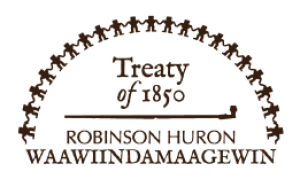 On February 24, 2023, the Government of Canada and the Métis Nation of Ontario (“MNO”) signed the Métis Government Recognition and Self-Government Implementation Agreement (“the Agreement”).
On February 24, 2023, the Government of Canada and the Métis Nation of Ontario (“MNO”) signed the Métis Government Recognition and Self-Government Implementation Agreement (“the Agreement”).
Robinson Huron Waawiindamaagewin (“RHW”) challenges the historical existence of distinct “Métis” communities in the Robinson-Huron Treaty territory and, as such, commissioned a study led by Dr. Celeste Pedri-Spade (McGill University) and Dr. Darryl Leroux (University of Ottawa). The report, ‘An Exploratory Study of Métis Nation of Ontario’s “Historic Métis Communities” in Robinson-Huron Treaty Territory,’ uncovered how the MNO’s poor research practices actively omitted historical data that calls into question their interpretation of “verified Métis family lines.” For example, the MNO has identified individuals as “Métis” even when individuals are consistently recorded as First Nation, which contradicts their stated approach. The report has documented hundreds of times that the MNO engaged in such misleading practices, proving the fatal flaws in creating “Métis communities” in Robinson Huron Treaty territory.
Chief Adam Pawis states: “The research utilized by MNO for the McLeod-Riel Métis family line claims an RHW Anishinaabe family as a basis for Métis membership. All the evidence surrounding this family points to their identity as Anishinaabe, not Métis”.
“The settler government of Canada and the MNO are attempting to push legislation through which will culminate with the signing of a “modern-day treaty” that will encroach upon the rights of RHW and its citizens. This fast-tracked push is an affront to the unextinguished rights and jurisdictions of RHW. We cannot sit idly by while the settler government continues to discuss and deal with groups claiming indigenous ancestry without our consent,” stated Chief Dean Sayers.
“The MNO currently has 31,000 members, a 55% increase since 2020. Most of its members are tied to one of the “Métis communities” in our territory, further impacting the rights of RHW communities and their members. Aside from the findings in Drs. Pedri-Spade and Leroux’s report, by the MNO’s own standards, over 5,000 of its members do not meet their membership criteria. RHW disagrees that the settler government of Canada can enter into these agreements, legislation and treaties with a group that has not demonstrated through sound research the legal existence of distinct Métis communities in our territory.
“The Anishinabek have not given the Métis any rights and do not recognize any MNO communities or any rights that the Crown may give them. It is contrary to our understanding of who can give those rights, which is the Anishinabek; and not the Crown or government,” stated Ogimaa-kwe Linda Debassige.
“Canada is seeking to delegate rights to the Métis when they are, in fact, in receipt of a delegated authority to be on RHW lands. Delegating rights to the MNO with dubious ancestral claims violates their Treaty promise. They do not have the right to delegate any rights to the MNO. That contemplation should come from RHW,” stated Chief McLeod.
The Wabun Tribal Council applied for judicial review of the MNO’s Agreement in March 2023. The application for judicial review states that the MNO Agreement recognizes communities that may be unable to pass the Métis rights test established by Canada’s Supreme Court in R. v. Powley. RHW supports the position taken by the Wabun Tribal Council.
Canada must cease this practice and directly deal with the original rights-holders of this land.
- Exploration hivernale pour les élèves de l’école Saint‑Joseph - February 26, 2026
- Exploration hivernale pour les élèves de l’école Saint‑Joseph - February 26, 2026
- New student trustees elected at CSC Nouvelon for the next school year - February 26, 2026
 Wawa-news.com Local and Regional News
Wawa-news.com Local and Regional News